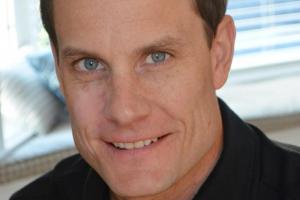
Litigator turned “wellness lawyer” Andy Clark worked for the largest firm in Atlantic Canada when he started tagging along with his wife to professional wellness conferences and seminars. Interested in what he was learning, he began blogging about health, wellness, and the challenge of living healthily as a working lawyer. Several years later he is a published author, consultant, speaker and leader in the niche field of lawyer wellness education and awareness. UBC Law spoke with Andy from his home in Fredericton, New Brunswick about the common misconceptions of living a healthy lifestyle, his 180-degree career transition and his top time-saving wellness tips for stressed-out lawyers.
How did your career change come about?
I started to get more and more interested in healthy lifestyle and practicing law within a wellness lifestyle, and not letting the pursuit of a successful law practice sort of sabotage my health, happiness, relationships etcetera. It opened my eyes to the fact that the majority of information that most of us, lawyer or not, take on, with respect to what health is, where it comes from, and what you need to do to be healthy – and it is really not the right information when you step back and take a look at it.
That really woke me up, so I really started to study for myself the reasons for that and to really understand at a deep level what it takes to create this balanced, successful life with a successful law practice – or whatever career you happen to be in – and also have successful love relationships, home life and parenting, health and fitness, emotional well-being and a spiritual life.
I started to blog about it as a “wellness Lawyer” while I was still practicing law. I started getting calls from bar associations to come and share what I was learning and implementing and now I coach lawyers and consult with businesses and speak at law firms, and I’ve just launched a new course called Life Balance Blueprint, so it’s all very good.
How did you know that this was a passion strong enough to warrant a 180-degree career change?
I didn’t have any health crisis, I didn’t lose somebody close to me, there wasn’t that one event where I said ‘oh my goodness,’ but it is more my combined learnings and realizations that practicing law, for me – which I was good at, and when I left I had just finished my most profitable year ever – it wasn’t where my ultimate passion resided. I decided if I’m going to spend the next twenty to forty years of my life working, I should probably do it where my passions reside.
The way I realized that I was more passionate about wellness than practicing law was that I spent a lot of my spare time learning about health and wellness and working on the blog rather than working on building my law practice. What does that tell me? That tells me that maybe I should be focusing more of my time on that.
I also think there’s a tremendous need in the profession for people to step up and try to really challenge a lot of the common perceptions that lawyers take on, either consciously or subconsciously, when they start practicing – which is that the practice of law or being a successful lawyer inherently requires self-sacrifice. That “it’s just the way it is,” that that’s what you signed up for. There are lots of benefits to being a lawyer and maybe they think the trade-off is health or happiness or relationships, and I just really don’t believe that’s the case.
What would you recommend to a busy working lawyer who doesn’t know where to begin?
The first tip is that it’s not an all-or-nothing thing. Little steps can make a huge impact. So for instance, drinking enough water every day. Wellness doesn’t necessarily have to take more time, in fact it can save you time. So my top three time-saving wellness tips are:
1. Drink eight glasses of water a day. It doesn’t take any time and it’s hugely beneficial.
2. Exercise for a lot less time than you think is necessary. A lot of lawyers think exercise equals a lot of time at the gym, but that is not true at all; exercise can be ten or fifteen minutes a day – that’s better than nothing. So exercise, but do so for shorter periods of time rather than zero exercise.
3. Be grateful. Express gratitude on a daily basis. Return to gratitude and to things that you are grateful for in times of stress. It automatically helps you reconnect with the big picture of things and not get lost in the day-to-day stresses of the profession.
All of these things save you time, and add a whole lot of wellness and balance to your life.
For more information about Clark’s wellness education and seminars, see www.wellnesslawyer.com.